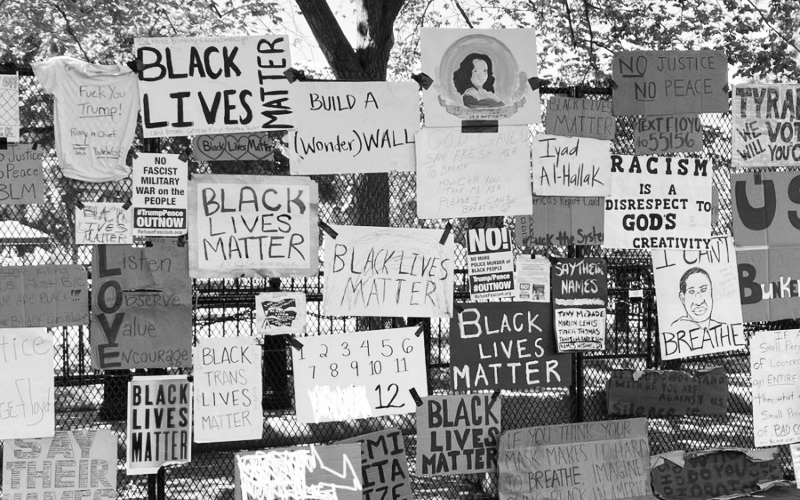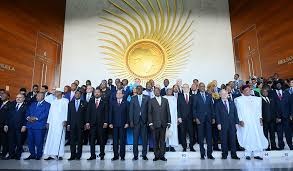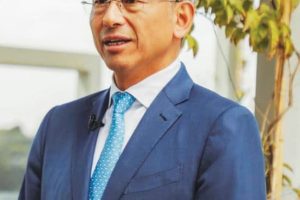
Those last two weeks shook not only America but also the world. The revolt was unprecedented, massive, angry, all-inclusive, multi-ethnic, color-blind, and gender equalizer. The two weeks were a turning point in race relations in America. Perhaps for the first time in the 400- year history of racism in America, white, supremacist ideology and idiocy have received a good beating. For the first time in history, an unprecedented number white Americans have taken part in peaceful and violent demonstrations, in spite of the COVID-19 threat, putting their lives into danger, and putting America’s 400 year long racist establishment on the operating table and dissecting it from feet to toe and declaring that it is indeed in the throes of terminal illness.
A young girl was asked on CCN why she is taking part in the demonstrations despite the corona virus threat and the breaking of the social distancing rule. Her angry answer was straightforward. She said that if her action will help her younger sisters and brothers and nieces achieve a better future she did not care dying from COVID-19. That was perhaps the loftiest expression of contempt to death in any form if one dies for freedom or for any just cause.
It is indeed astonishing to realize that race relations in America has a 400 year history and it is continuing to catch the imaginations of generations after generations with growing lucidity, clarity, commitment and determination that was evident when Martin Luther King was and delivering his historic “I have a dream” speech and Malcolm X was being assassinated for his uncompromising criticism of the white supremacist establishment in America.
One of the chief characteristics of the present black revolt against the white-dominated police establishment and justice system is that it has galvanized international public opinion and mobilized an unprecedented level of criticism and opposition from the white population against the horrible murder of George Floyd that came at the worst time in America. The 17 years-old girl who took the graphic video of Floyd’s assassination should be credited for her contribution to citizen journalism that led to the massive protests. Without her effort, the truth might have been left untold or covered up and if told by the traditional media, it could have been dismissed as nonsense.
Most white people were usually aloof when it comes to black issues, but this time the table is turned and they came out into the street in great numbers. The political, economic and social situation in America is also affecting the white majority of the population that is being hit by unemployment, falling incomes, the pandemic and a presidency that is out of tune with the needs and aspirations of the American people. This is in fact the main reason that helped George Floyd’s murder to overcome the racial divide and unite all Americans in a common cause for justice and fairness.
The global reaction to one of the tragic events of history has demonstrated how the world is coming closer together and an injustice in one part of the world is equally felt in other parts of the world where the same problem has been plaguing the people for decades if not for centuries. This is the reason why black and white people marched side by side in Britain. France, Australia, Germany, Italy among other places. And this is the reason why George Floyd’s death has turned from a domestic American issue to a global phenomenon involving, non-black people simply because the issues and emotions are shared by people where racial injustice is still the norm anywhere in the world.
A notable exception in this global opposition to racial injustice is Africa where no protest action was taken against the recent events in America with the exception of some form of popular disapproval in south Africa and a written censure by the African Union disapproving the tragic events that led to universal condemnation. History testifies to the fact that African-Americans, as their name indicates, were taken by force from Africa and turned into slaves whose labor developed the United States through tragic exploitation, mass repression and institutionalized segregation for the last 400 years. Black Americans are not only the natural brothers and sisters of Africans, but they are themselves Africans who prefer to be called as such rather than be taken as Americans. Black people in America have suffered and struggled, died and survived for centuries in order to give the United States its present shape and glory. Non-black people who flocked to the United States after the Gold Rush and the economic booms of the last centuries enjoyed better opportunities and fair treatment. On the contrary, blacks who were always behind America’s wealth and grandeur, were emancipated by law but remained virtual slaves and second citizens in real life. George Floyd’s tragedy is a graphic illustration that black America’s tragedy is not yet over.
Black Americans not only fought and died for their rights. They were also vocal opponents of Apartheid in South Africa and colonialism all over Africa because of their racial affiliation as well as the emotional attachments they have with Africa and the black world as their real and original homeland. It was not for nothing that Marcus Garvey, one of the heroic proponents of black emancipation, came up with the “Back to Africa” movement and demanded that blacks in America should be for compensated for centuries of economic exploitation they endured and go back to Africa to live in freedom and prosperity.
Marcus Garvey’s politics of return to Africa had many followers both within and outside America. His vision failed to materialize simply because history took another turn and he suffered censure and persecution from the white establishment in the United States. Garvey’s ideas had also many adherents in Africa at a time when the continent suffered under the yoke of European colonialism that was as severe and as brutal as white American racism.
In the post-II World War period, America became the number one economic and military power in the world while the fate of blacks in America worsened. The wealthier and stronger the US became, the more brutal its policies became against its own black population. This in turn strengthened the bond of solidarity between Africans in the US and those from the homeland. The generations of Africans who went through the colonial period of African history and afterwards, fought against racism in all its forms and triumphed in the 1960s. This generation of Africans produced intellectuals and leaders like Nkrumah, Diop, Biko, Mandela, Senghor, Fanon and many others who looked at the black struggle against racism in Africa as an extension and part and parcel of the struggle of Africans against colonialism. This struggle had also enjoyed the sympathy and support of white intellectuals like Jean Paul Sartre in France and Albert Camus, a French philosopher of Algerian descent.
In the decades following African liberation, the tie between blacks in America and in Africa became looser and weaker while the US became the undisputed world leader in soft and hard power. This process culminated in its status as the lone superpower following the demise of the former Soviet Union. Meanwhile, black oppression intensified everywhere and the vocal intellectuals who helped the struggle against colonialism and imperialism were gone. They were not replaced by new voices, and the new generations of Africans that came afterwards could not own the legacy. Many of them and subsequently became victims of American soft power and its growing appeal to young Africans who dreamt to go to the “New World” and live the American dream that later on proved to be only another nightmare for black people.
The election of a black American president generated many hopes that were dashed later on and the fate of the majority of Afro-American remained unchanged and even worse. Black people in America continued to fill prisons and became the victims of rampant unemployment, social inequalities, criminality and hopelessness. The Obama presidency left black people largely unaffected and his attempts to change some aspects of the white dominated racist system were quickly reversed as soon as he left the White House. However, the worsening situation served as a catalyst to subsequent black revolts and the birth of “Black Lives Matter” movement culminating in George Floyd’s assassination and the recent protests.
As we said above, a notable absence from the scenes of the recent protest were Africans living in the United States excepting Somalis who are numerous in Minneapolis, Minnesota and Nigerians in Washington and other states. The rest of the African Diaspora populations were largely invisible during the mass rallies and demonstrations either due to fear of the pandemic or to the absence of a sense of solidarity that has been weakened or seriously undermined in the previous decades.
Most African Diaspora in the US are there to improve their livelihoods, get a good education or share the American dream. Yet, many Africans who flocked to the US are mainly well-educated and well-connected and politically active in their home countries. They are materially better off than the majority of Africans who went there through the diversity lottery system.
Anyway, we look at it, African youths, contrary to their peers in the decades of African liberation, are now emotionally and practically detached from what troubles their American compatriots. This is no good news for the millions of black and white Americans who continue to believe that black lives matter wherever they are found. Undoubtedly, many African youths have missed the opportunity to make themselves heard and be part of the emerging global youth movement against racial injustice and its ramifications. The Somali and Nigerian youngsters who were visible during the protests deserve praise because they braved danger to be part of the new global movement for freedom and justice.
The Ethiopian Herald Sunday Edition 14 /2020
BY MULUGETAS GUDETA





